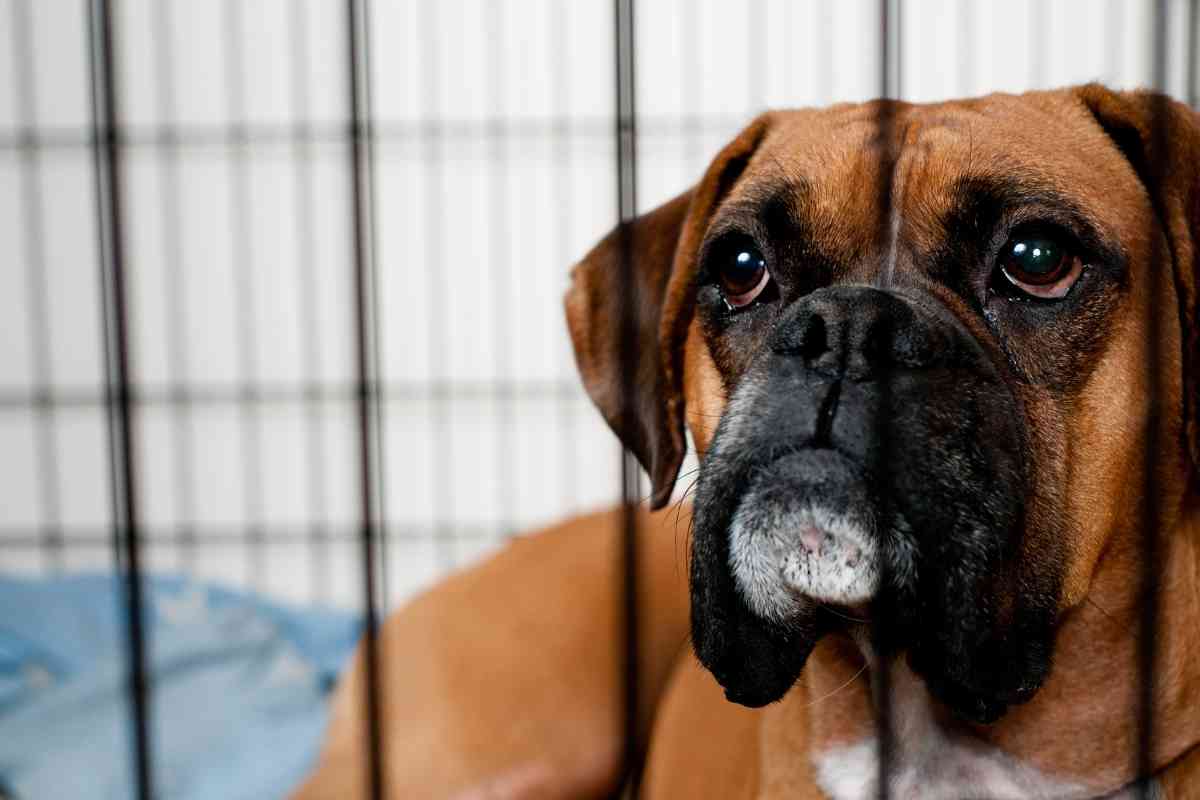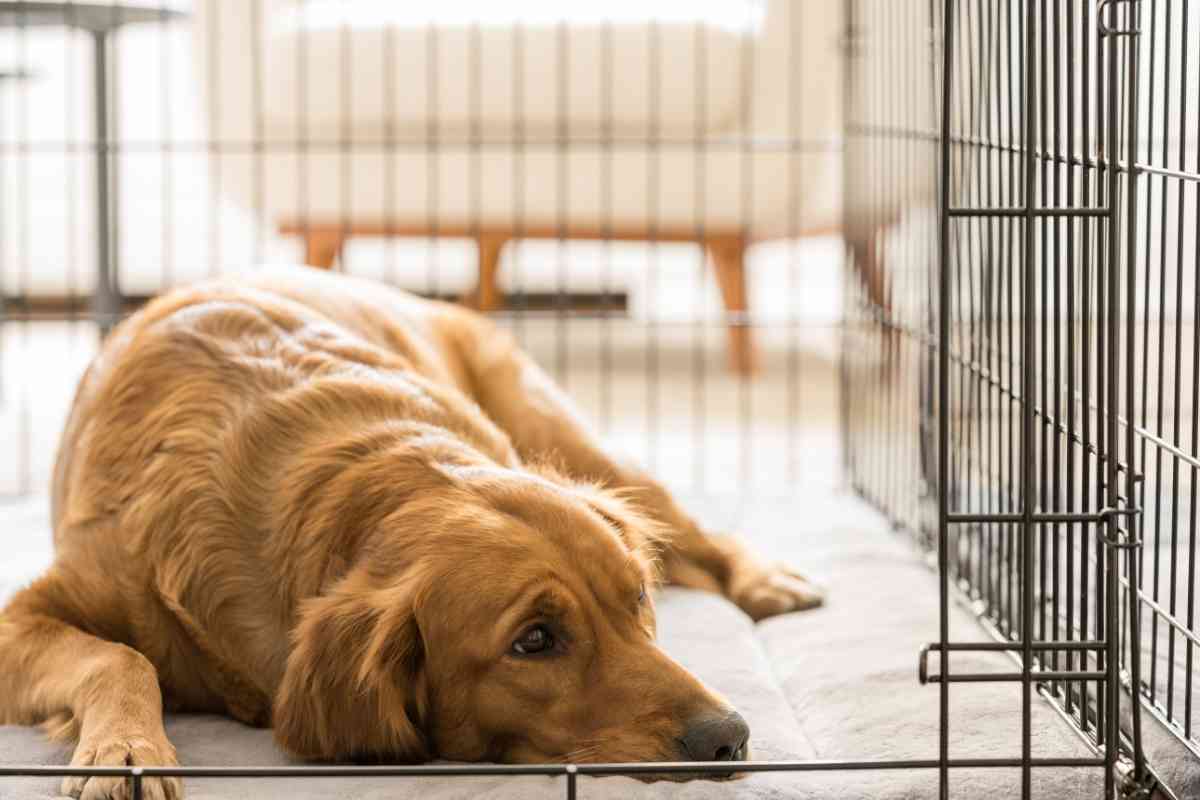How Do You Know When You Can Stop Crating Your Dog At Night?
Crate training is a very useful

At what age can you stop putting your dog in a crate at night?
You can stop using crates at night once your dog is fully mature, emotionally. For smaller breeds, this takes less time, while for larger breeds it takes a bit longer. On average, you can stop crating at night somewhere around the time the dog is 1 to 2 years old.
There are plenty of things that make a difference in whether your dog is ready to sleep out of the crate, but emotional maturity is generally considered to be the key element.
We took opinions from dog experts and people who have given their puppies crate training while doing our research.
Factors That Affect Maturity in Dogs
Dogs’ crate training usually involves keeping your dog in a crate for periods of time so they can get used to the environment, and also for house training purposes. But when your dog is ready to start sleeping outside the crate without soiling around the house depends on multiple things.
Emotional maturity, as mentioned earlier, is the most important element, but this varies across all dogs. Age, breed, environment, and other such factors also affect how soon dogs reach maturity. Let’s take a look at some of them.
Age & Breed
Most puppies will usually develop emotional maturity at around 12 to 18 months old. At this point, it is usually safe to let them sleep outside the crate, but you may find that puppies exhibit childish dog behavior until around 24 months old.
You may have to make the decision according to your pup, but for the most part, 18 months is enough for your puppy to become mature.
Depending on the breed, some dogs reach emotional maturity much faster. For example, smaller breeds have been observed to mature faster, but there are no real studies or research conducted to prove this.
Keep in mind too that small dogs have smaller bladders and cannot necessarily hold their pee as long as larger dogs.
You can just keep in mind that your dog will likely be able to sleep outside the crate around the time they’re 1 to 2 years old.
Temperament
Every dog has a different temperament and personality. Some are very hyperactive, while others are more mellow. Temperament is usually a good indicator of whether your dog is likely to reach maturity earlier or later.
Dogs with a lot of energy are likely to take longer. Some dog breeds like terriers take a very long time, but these will also calm down by around 2 years of age. At that point, you can let your dog sleep out of the crate.
Dog Training
If you’ve been training your dog and socializing with them from a young age, they’re much more likely to mature faster. Dogs that have already been trained in other areas will understand what is expected of them, and can usually be trusted to sleep out of the crate much earlier than dogs who have not been trained as much.
By establishing house rules and training your dog properly, you can let your dog mature faster and be more reliable at a younger age.
When Should You Stop Crating Your Dog At Night?

So, given that emotional maturity matters and the various factors that are to be taken into account, when do you actually stop crating your dog?
Dogs are least active at night, but they still don’t sleep throughout the night. In fact, dogs are polyphasic sleepers, which means that they have multiple sleep cycles within one night – in comparison to humans, who will usually sleep long hours.
So, if your dog is not sleeping in the crate at night, they can easily wake up and roam around the house. This means that they will also be free to do things you might not want them to do, like knock things over, soil the house or chew on your upholstery.
If you think your dog has matured enough, you could technically stop crating them at night. For this, you’ll have to keep an eye on them during the day to determine whether they are showing signs of responsibility.
For example, if you have established that your dog is not allowed to jump on furniture or chew on things, and your dog follows these rules, they are probably mature enough to stick to them when you’re not around.
If your dog still has the habit but occasionally, you might want to continue crating for a while longer. Determining when to let your dog out of the crate at night largely depends on their behavior during the day.
If your dog has started showing signs of maturity, but is still letting go of some bad habits, you can also opt for a playpen as a replacement. A playpen will keep your dog otherwise occupied with a little more space to roam around and toys to play with than a dog crate, but still confined to a specific area.
That said, you should never keep your dog in the crate for more than a few hours at a time.
Why It’s Important to Determine The Right Time to Stop Crating
Crate training happens for a reason. Stopping too soon may come with its own set of problems.
Injuries
One of the obvious risk factors, and the most important one, is that if you let your puppy out too soon, they could get injured while roaming around alone at night.
Because dogs (and especially puppies!) are curious, they will want to explore, but doing so may result in them knocking things over and hurting themselves. If you are not around, you wouldn’t be able to get them to care for any potential injuries in time.
Destroying Your Belongings
Besides hurting themselves, your dog can also destroy your things if they are left to their own devices. They may break fragile items, or chew on your pillows or shoes, and get up to other such mischiefs. Most dogs are chewy for a while – up until they are around 2 years old, for some. You can’t do much about chewy dogs, for the most part, but you can train them.
Until they are fully trained though, it’s best to keep them in their crate at night.
Your Sleep Quality
As mentioned earlier, dogs don’t sleep the whole night and are very light sleepers. This means that even the slightest of sounds can alert them and wake them up.
So if your house is not fully soundproof, or if you have noisy neighbors, your dog will consistently be waking up and running around the house.
This may result in your own sleep being disturbed. Until your dog can spend the night without becoming too active, it should be kept in the crate.
Keeping a hyperactive dog in the crate at night will also regulate their sleep cycle a bit. If your dog is too active at night, they’ll be loafing and lazing around during the day.
This will disrupt their ability to get the required amount of exercise, and the time they spend with you.
Staying in the crate would mean that they are forced to stay in one place so that they can use that energy the next day.
Soiling
Crate training helps a lot with potty training. Dogs between 1 and 2 years old are usually old enough not to soil the house, but the crate gives them an extra push to not just let go wherever they are.
Because dogs like being clean, they don’t want to poop or pee where they sleep. Crates are small, and they have to sleep in them, so they wouldn’t want to do their business there, and would hold it in.
This helps train them to hold it in until they get outside before letting go.
If your dog has extra space, they don’t have a lot of qualms in just going for it where they are and then moving away. If your dog isn’t fully potty trained, keeping them in the crate at night may be a good idea.
Crate training is usually just temporary, but some people advise you to keep it permanent. The crate is a safe place for dogs and will usually go into it if they are not doing so well. Some treats can help too. It can also help you identify when your dog is feeling down and is convenient in keeping your house clean.
But not all dogs like their crates, and some dog owners are hesitant to keep their pups in a confined space. As such, you’d just want to crate train your dog until they are ready to sleep out of it at night.